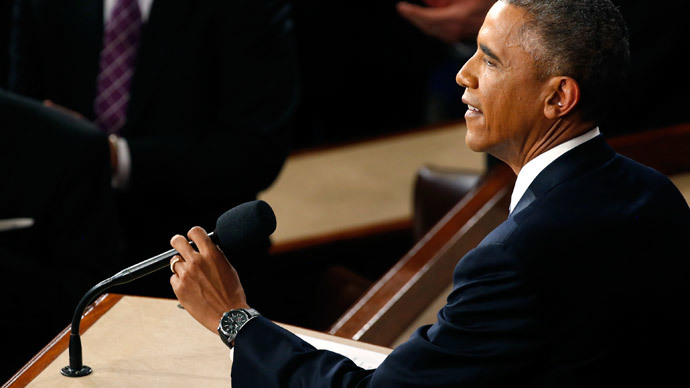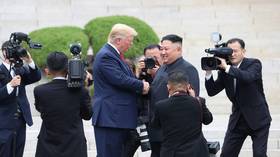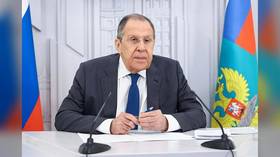‘US unilateral actions to protect its interests let other govts use same excuse’

US should hold itself to a higher standard and stop acting unilaterally and violating international rules whenever it feels its interests jeopardized, said Nick Sarwark of the Libertarian National Committee on President Obama’s State of the Union speech.
READ MORE: Obama faces GOP Congress with plans for middle class, cybersecurity, Gitmo
RT:President Obama appealed for bi-partisan support during the address. Has he got it from smaller parties like yours?
Nick Sarwark: I think that the President is going to face a tough road in the Congress that is primarily run by the Republicans now. The Libertarian Party agrees with him on a few points. We agree with him that we have to show more leadership by finishing the job of closing Guantanamo, we agree with the opening of relations with Cuba.
Chris Bambery, political analyst on Obama State of the Union Speech: “In terms of foreign policy, there is not much [Obama] can point to in terms of success in his speech. You know he said he was going to close Guantanamo, but he said that when he was first elected two terms ago. If he does eventually close Guantanamo before leaving office people might ask why it is taking so long.”
Where we disagree is this idea that we can again try and project military force around the world and do that in a way that doesn’t involve any American boots on the ground. We’ve seen that strategy before and every time that it is sold to the American people as, “We’ll support a moderate group in this or other country,” it always ends up with those guns being turned back against our soldiers. That is a point where we differ.
The President has also a number of proposals that expand the use of government, that expand the spending of tax dollars, that create subsidies and we fundamentally disagree with that. We believe that the way that you make education more affordable is you let the free market work. You don’t subsidize it like he wants to do it with community college.
Brian Becker, director of Answer coalition: “The US has allowed itself the right for an open-ended bombing campaign in both Iraq and Syria not just for months or years but perhaps for decades… [Obama] has acted without any authorization and the Congress has not demanded to be party to the whole process even though the US Constitution states clearly that only Congress can declare war and this is clearly a war.”
That the way you show leadership around the world is with trade and free relations between peoples without engaging in military actions or sanctions, that being a good trading partner and having people talk to each other and individuals is the way that you create change around the world and show that example.
RT:The President also said America and its allies could take unilateral action to tackle terrorist groups. What message does this send about America's attitude to international law?
NS: It’s the same message that we’ve sent for decades under Obama and Bush. The American government has been willing to strike with drones, or with Special Forces, or soldiers all around the world wherever our government feels that our interests are jeopardized. The problem with violating international norms in that way is that then opens it up for other governments to make the same excuses and say: “Well, Americans did it, so you can do it too!”
Chris Bambery, political analyst on Obama State of the Union Speech: “Idea that the Americans have driven back Islamic State in Iraq and Syria is always laughable. There have been some slight reverses for Islamic State. But they continue to hold the land as large as it was before the Americans began the intervention and there is no sign that it’ll be driven out of there anytime soon.”
I believe that America should hold itself to a higher standard. There is a difference between being able to go act unilaterally, and it is being a good idea, good for America long-term. When we act unilaterally we get ourselves involved in conflicts that we end up having to finish. It’s easy to bomb Iraq, but then 11 years on you are still in Iraq trying to clean up the mess from that unilateral bombing. So just because we have the power to act unilaterally around the world doesn’t mean we should necessarily use it.
Brian Becker, director of Answer coalition: “There is no international law that’s considered to be criteria for US actions. The UN is quite clear that neither the United States nor any other country has the right to attack another entity except in the instance of imminent self-defense and yet the Obama administration has carried out a policy of endless drone strikes … As we can see in Iraq and Syria, they can declare who the enemy is.”
RT:Obama spoke out against sanctions on Cuba and Iran, but praised similar measures against Russia. Why is there such discrepancy?
NS: Maybe it hasn’t been 40 years of sanctions not working against Russia yet. The discrepancy always looks like a good idea at the time. It is the quick and easy thing to do and the work and actual diplomacy and hashing out these issues and persuading people is hard. Sanctions are easy and it’s easy for congressmen go back to their constituency and say: “Look, I did something.” But that doesn’t address the underlying issues in the way that diplomacy does. We can impose more sanctions on Russia, but long-term that doesn’t address the underlying problems.
The statements, views and opinions expressed in this column are solely those of the author and do not necessarily represent those of RT.
The statements, views and opinions expressed in this column are solely those of the author and do not necessarily represent those of RT.













